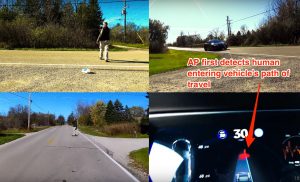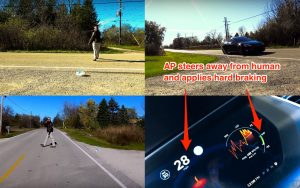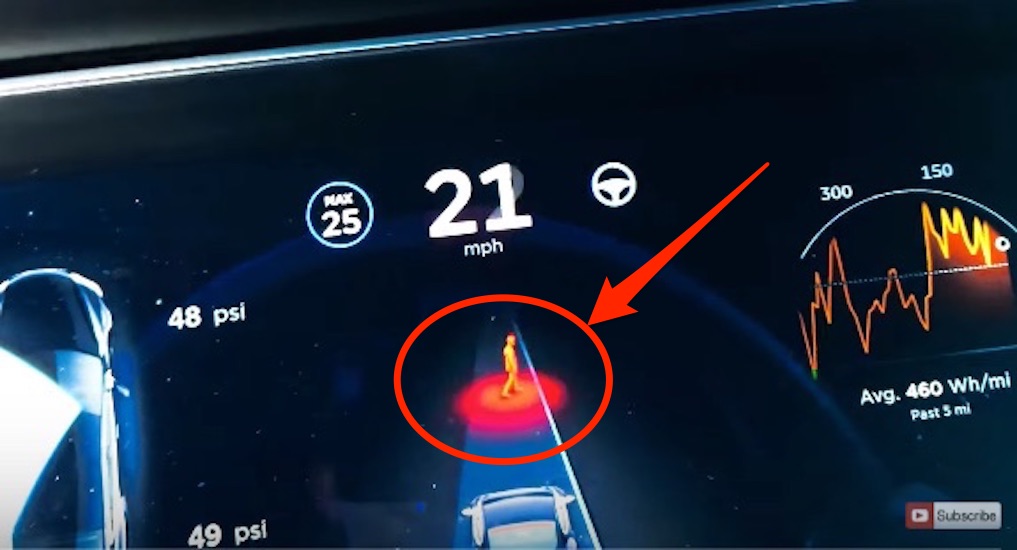
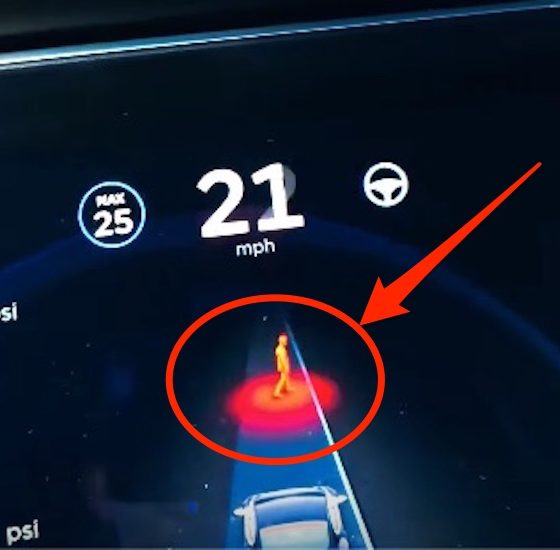
Lifestyle
Who knew, Tesla Autopilot has a human collision avoidance system
Tesla released arguably one of the biggest over-the-air software updates in its company history when it introduced Version 8.0 with updated Autopilot in September. Not to be confused with the more recent announcement that new Model S and Model X vehicles are equipped with next generation “hardware 2” capable of Full Self-Driving, Autopilot under Version 8.0 leveraged two-year-old hardware to issue enhancements in drivability and safety through advancements in radar signal processing.
By placing more emphasis on input from the vehicle’s forward-facing radar, Tesla Autopilot was able to detect vehicle activity from two cars ahead and better react to sudden emergency braking events. A recent test using a Model X while trailing two vehicles – the furthest vehicle would simulate an emergency braking situation – demonstrated that Autopilot was able to automatically react to activity beyond what its human driver could see.
But how does v8.0 Autopilot fare against activity from a non-vehicle – let’s say, a human obstacle? Previous tests put together by Tesla owner and YouTuber KmanAuto attempted to see just that. Using a very trusting friend, Kman was able to demonstrate Autopilot’s lack of ability to account for pedestrians when it comes to emergency braking under version 7.0.
Back at it again, and with the same friend Mike Anthony, the duo staged seven separate tests to see how the latest Version 8.0 Autopilot, using radar-based technology supplemented by the front-facing camera, was able to handle situations involving a human obstacle.
Tesla Autopilot under Version 8.0 vs. Human (Mike)
Before we jump into the results of the various tests, we’d like to note that Teslarati in no way endorses or recommends this type of stunt, or any activity of similar nature.
We’ve provided the full video here with outcome of the results summarized below. Be sure to also check out the video from Mike’s perspective.
Test 1 – Tesla @ 20 mph vs. Human in middle of lane
Description: Vehicle was able to detect Mike and gradually come to a complete stop on its own with no driver input. Display did not show an object. No human collision warning appeared.
Video of Test 1 (open link in new window to jump to test)
Test 2 – Tesla @ 20 mph vs. Human walking in front of the car
Description: Vehicle was able to detect Mike walking into the car’s path of travel and bring itself to a complete stop. As Mike walked backwards and away from the vehicle, Autopilot Traffic Aware Cruise Control (TACC) was able to keep its distance to Mike and proceed forward as Mike inched backwards.
Test 3 – Tesla @ 20 mph vs. Human walking from side of road in front of car and then off the road again
Description: Vehicle was able to detect Mike walking into the car’s path of travel and bring itself to a complete stop. As Mike walked off to the side of the road, TACC resumed.
Test 4 – Tesla @ 20 mph vs. Human walking in front of the car
Description: Same as Test 2.
Test 5 – Tesla @ 30 mph vs. Human jogging across all lanes in front of vehicle
Description: This is the first sighting of a human collision warning indicator. Vehicle detects Mike and attempts to hard brake. “In the interest of safety I helped [brake] it, the car gave me a collision alert and it also applied the brakes.”, says Kman.
- Tesla Autopilot detects human entering from side of road and begins to Autosteer while applying brakes
Kman indicates that the vehicle likely would not have stopped in time to prevent hitting Mike but it would have severely lessened the force of impact and possibly lessened the severity of human injury.
Test 6 – Tesla @ 25 mph vs. Human walking in front of the car
Description: Vehicle was able to detect Mike walking into the car’s path of travel and bring itself to a sudden stop and avoid impact.
Test 7 – Tesla @ 35 mph vs. Human standing directly in front of moving car
Description: Vehicle was able to detect Mike standing before the car and bring itself to a quick stop though no visual warning was seen on the display. It would appear the human collision warning only appears with objects that are non-stationary and enter the vehicle’s path of travel.
Conclusion
The test demonstrates Tesla’s remarkable ability to continuously improve upon its Autopilot suite of features through changes to its set of algorithms driven largely by data collected through the company’s fleet learning program. The test is also significant in that Tesla was able to dramatically improve the safety on its vehicles – now capable of performing emergency braking events when a human is detected – purely over-the-air and with no hardware improvements whatsoever.
With Autopilot 2.0 consisting of seven more cameras and enhanced long range sonar sensors fed from billions of miles worth of driving data, it’s not a question of if Tesla can reach full Level 5 autonomy, but one of when.

Lifestyle
Tesla Model S Plaid battles China’s 1500 hp monster Nurburgring monster, with surprising results
There is just something about Tesla’s tuning and refinement that makes raw specs seem not as game-changing.
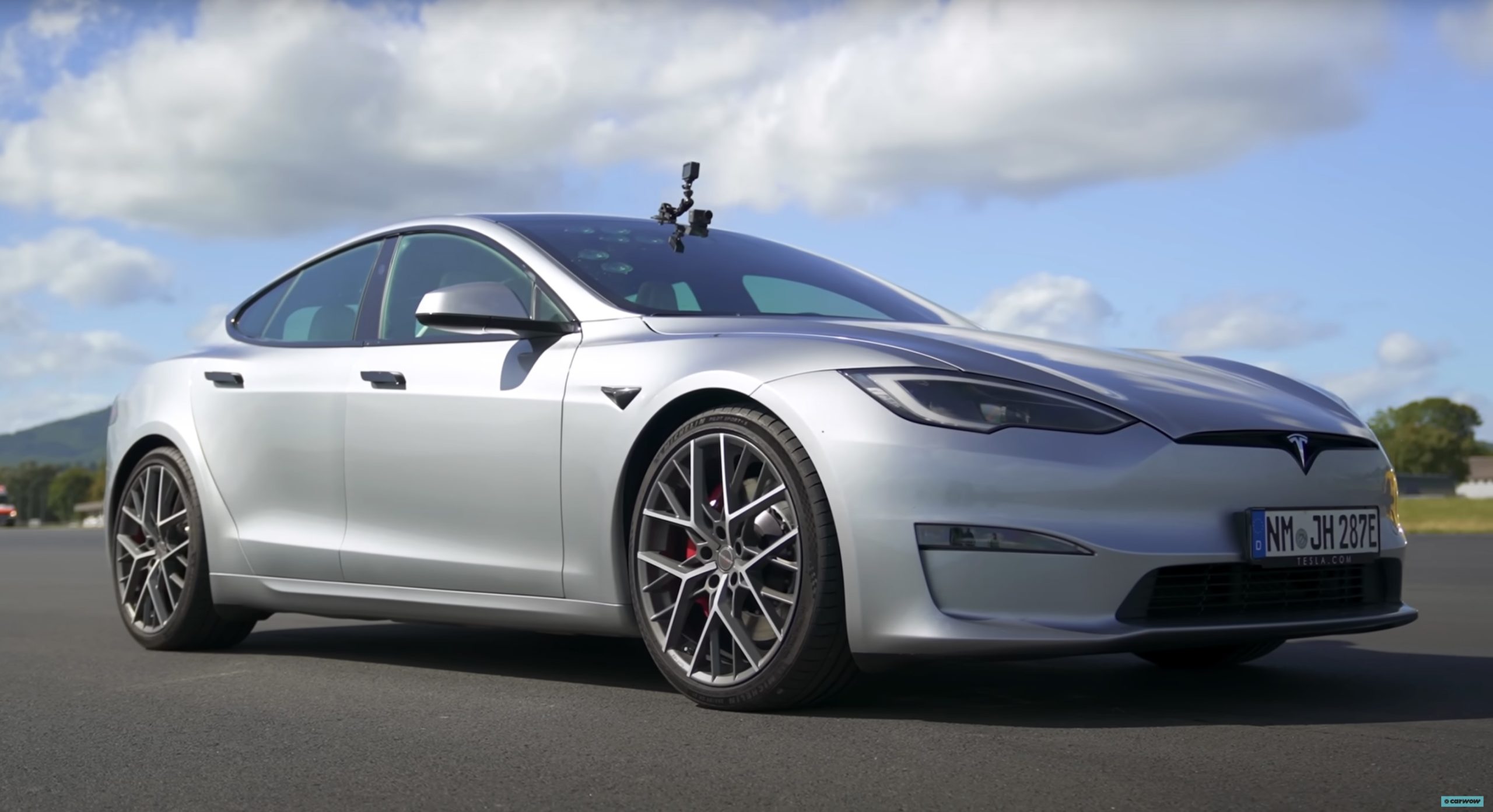
The Tesla Model S Plaid has been around for some time. Today, it is no longer the world’s quickest four-door electric sedan, nor is it the most powerful. As per a recent video from motoring YouTube channel Carwow, however, it seems like the Model S Plaid is still more than a match for some of its newer and more powerful rivals.
The monster from China
The Xiaomi SU7 Ultra is nothing short of a monster. Just like the Model S Plaid, it features three motors. It also has 1,548 hp and 1,770 Nm of torque. It’s All Wheel Drive and weighs a hefty 2,360 kg. The vehicle, which costs just about the equivalent of £55,000, has been recorded setting an insane 7:04.957 at the Nurburgring, surpassing the previous record held by the Porsche Taycan Turbo GT.
For all intents and purposes, the Model S Plaid looked outgunned in Carwow’s test. The Model S Plaid is no slouch with its three motors that produce 1,020 hp and 1,420 Nm of torque. It’s also a bit lighter at 2,190 kg despite its larger size. However, as the Carwow host pointed out, the Model S Plaid holds a 7:25.231 record in the Nurburgring. Compared to the Xiaomi SU7 Ultra’s record, the Model S Plaid’s lap time is notably slower.
Real-world tests
As could be seen in Carwow’s drag races, however, Tesla’s tech wizardry with the Model S Plaid is still hard to beat. The two vehicles competed in nine races, and the older Model S Plaid actually beat its newer, more powerful counterpart from China several times. At one point in the race, the Xiaomi SU7 Ultra hit its power limit due to its battery’s temperature, but the Model S Plaid was still going strong.
The Model S Plaid was first teased five years ago, in September 2020 during Tesla’s Battery Day. Since then, cars like the Lucid Air Sapphire and the Xiaomi SU7 Ultra have been released, surpassing its specs. But just like the Model Y ended up being the better all-rounder compared to the BYD Sealion 7 and the MG IM6, there is just something about Tesla’s tuning and refinement that makes raw specs seem not as game-changing.
Check out Carwow’s Model S Plaid vs Xiaomi SU7 drag race video below.
Lifestyle
500-mile test proves why Tesla Model Y still humiliates rivals in Europe
On paper, the BYD Sealion 7 and MG IM6 promised standout capabilities against the Model Y.
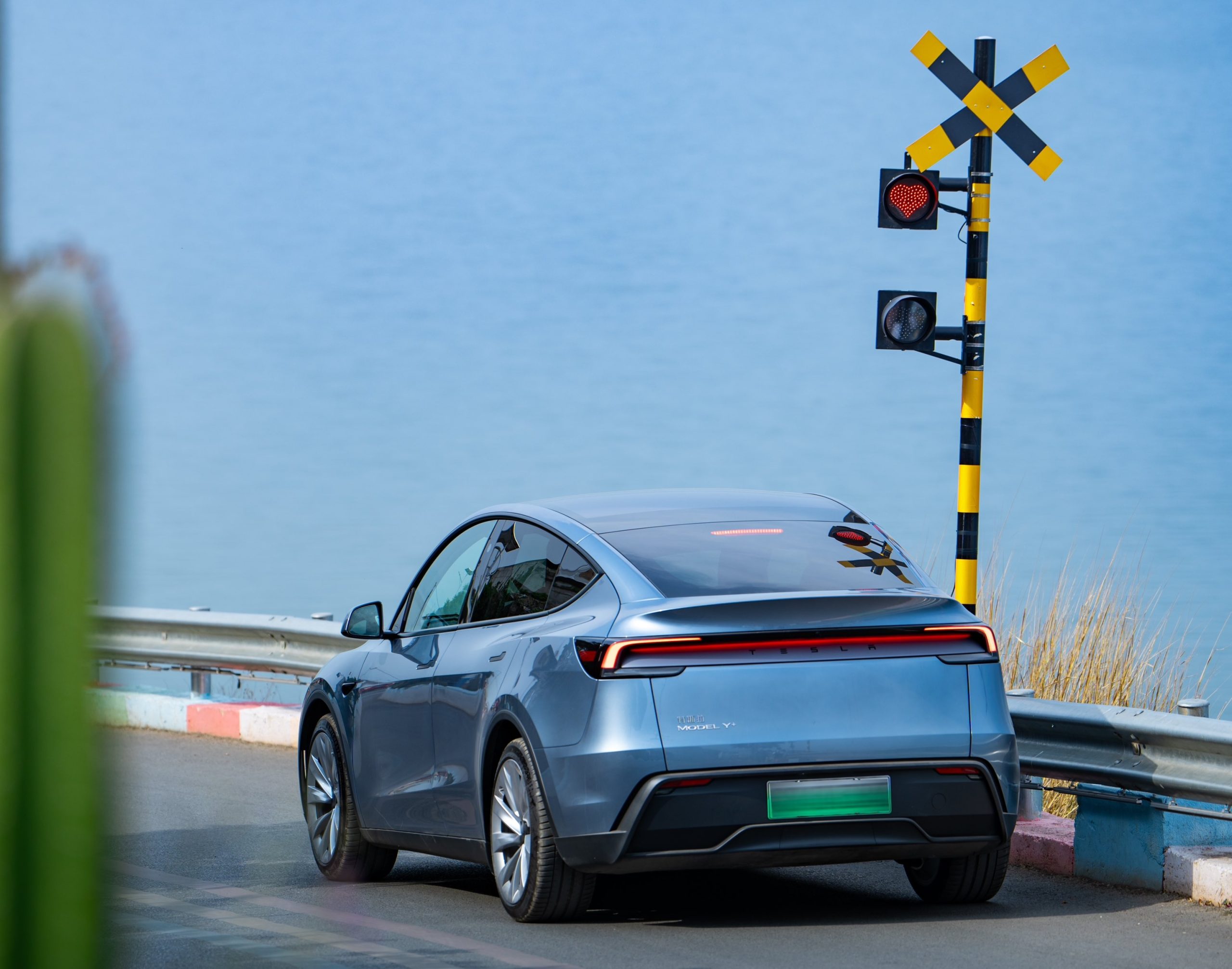
BYD is seeing a lot of momentum in Europe, so much so that mainstream media has taken every opportunity to argue that the Chinese automaker has beaten Tesla in the region. But while BYD sales this year in Europe are rising and Tesla’s registrations remain challenged, the raw capabilities of vehicles like the Model Y are difficult to deny.
This was highlighted in a 500-mile challenge by What Car? magazine, which showed that the new Tesla Model Y is more efficient, cheaper to run, and more reliable than rivals like the BYD Sealion 7, and even the nearly 400 KW-charging MG IM6.
Range and charging promises
On paper, the BYD Sealion 7 and MG IM6 promised standout capabilities against the Model Y. The Sealion 7 had more estimated range and the IM6 promised significantly faster charging. When faced with real-world conditions, however, it was still the Model Y that proved superior.
During the 500-mile test, the BYD nearly failed to reach a charging stop, arriving with less range than its display projected, as noted in a CarUp report. MG fared better, but its charging speeds never reached its promised nearly-400 kW charging speed. Tesla’s Model Y, by comparison, managed energy calculations precisely and arrived at each stop without issue.
Tesla leads in areas that matter
Charging times from 25% to 80% showed that the MG was the fastest at 17 minutes, while Tesla and BYD were close at 28 and 29 minutes, respectively. Overall efficiency and cost told a different story, however. The Model Y consumed 19.4 kWh per 100 km, compared to 22.2 for MG and 23.9 for BYD. Over the full trip, Tesla’s charging costs totaled just £82 thanks to its supercharger network, far below BYD’s £130 and MG’s £119.
What Car? Magazine’s testers concluded that despite BYD’s rapid sales growth and the MG IM6’s seriously impressive charging speeds, Tesla remains the more compelling real-world choice. The Model Y just offers stability, efficiency, and a proven charging infrastructure through its Supercharging network. And as per the magazine’s hosts, the Model Y is even the cheapest car to own among the three that were tested.
Watch What Car? Magazine’s 500-mile test in the video below.
Lifestyle
Tesla Cybertruck slapped with world’s least intimidating ticket, and it’s pure cringe
One cannot help but cringe and feel second-hand embarrassment at the idea of a person just driving around with a stack of these babies.
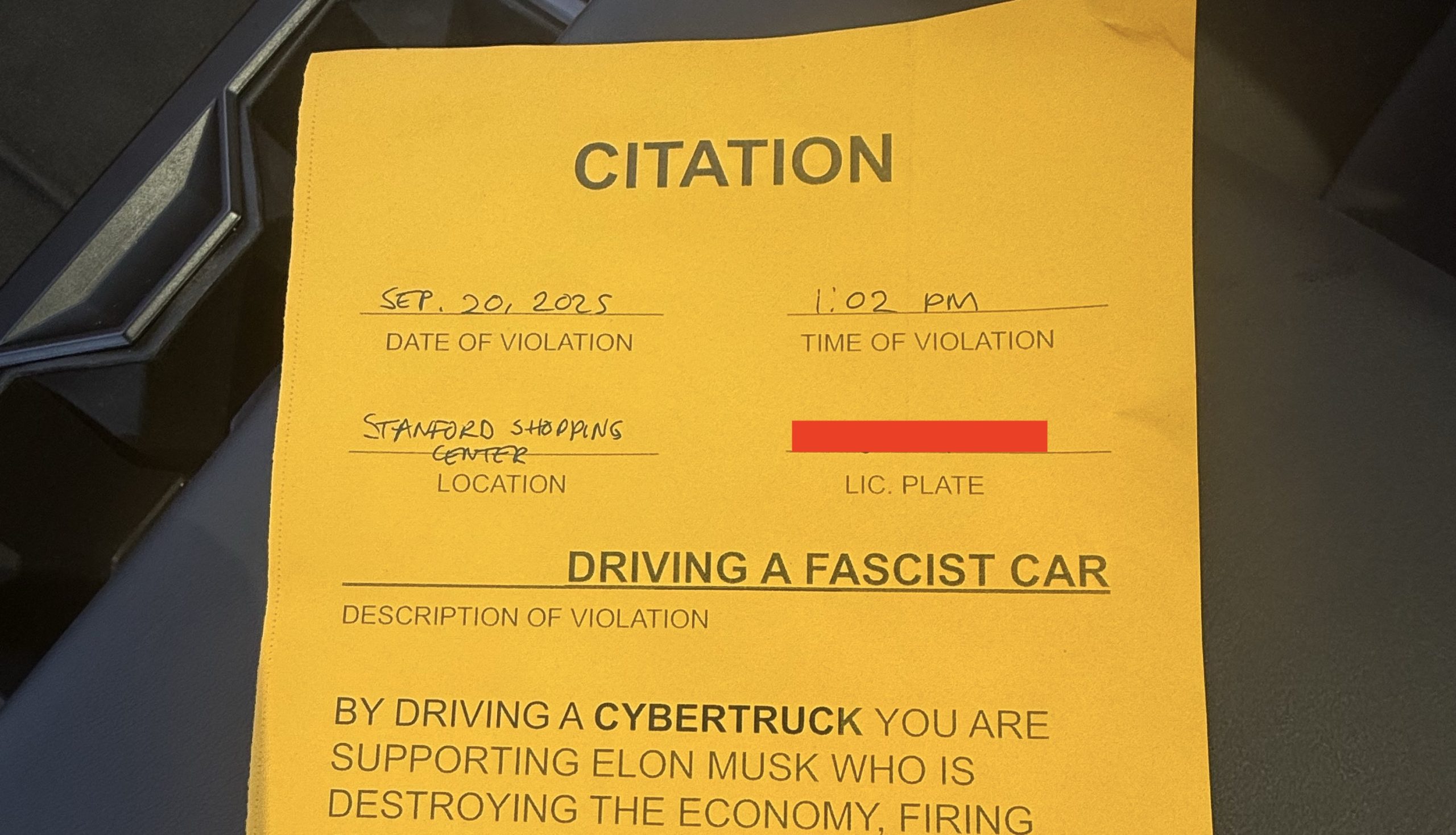
A Cybertruck parked at Stanford Shopping Center in California was recently hit with what might be the most try-hard piece of paper ever slipped under a wiper blade: a “fake citation” accusing the driver of supporting a “fascist car.”
The note, shared on X by Tesla staff program manager Ryan Torres, quickly made the rounds on X, where it quickly gained attention as an example of how not to protest.
The world’s least intimidating ticket
According to the citation, the supposed “violation” was “driving a fascist car.” The remedial action? Take the bus, call an Uber, or ride a bike. The note also dubbed Elon Musk a “chainsaw-wielding Nazi billionaire.” Now, protests against Tesla and Elon Musk have become commonplace this year, but one cannot help but cringe and feel second-hand embarrassment at the idea of a person just driving around with a stack of fake anti-Tesla/Musk citations.
Torres pointed out the irony himself in his post on X. Tesla currently employs over 140,000 Americans, and SpaceX has put the U.S. firmly back at the top of space technology. As Torres put it, maybe the person behind the world’s least intimidating ticket should “read a book on innovation before vandalizing” other people’s property.
Peak performative clownery
Not to mention that the fake ticket’s logic collapses under its own weight. EVs like the Cybertruck are literally designed to reduce emissions, not “destroy the economy.” If anything, Tesla has bolstered the United States’ economy by fueling jobs in engineering, manufacturing, and clean energy. It’s not the first time a Tesla has been the target of vandalism or politically charged notes, but this one stands out for sheer cringe value.
Torres summed it up neatly: “Peak clownery.” On that point, at least, the citation earns full marks. In a way, though, perhaps cringe fake tickets are not as bad as the literal firebombs that were being thrown at Tesla stores and cars earlier this year because some critics were gleefully misinformed about Elon Musk.
